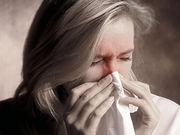Doses up to 40 mg of phenylephrine hydrochloride not linked to significant improvement
MONDAY, Nov. 2, 2015 (HealthDay News) — For patients with seasonal allergic rhinitis (SAR), phenylephrine hydrochloride (PE HCl) is no better than placebo for relieving nasal congestion, according to a study published in the September-October issue of the Journal of Allergy and Clinical Immunology: In Practice.
Eli O. Meltzer, M.D., from the Allergy & Asthma Medical Group & Research Center in San Diego, and colleagues examined subjective nasal congestion symptom relief and safety of four doses of PE HCl immediate-release tablets and placebo. A total of 539 adults with SAR were randomized to seven days of treatment with PE HCl 10-mg tablets at fixed doses of 10, 20, 30, or 40 mg, or to a placebo.
The researchers found that, compared with the placebo group, none of the PE HCl treatment groups had a significant change from baseline in instantaneous or reflective nasal congestion scores. At doses of up to 30 mg, PE HCl was tolerated. Overall, 18.4 percent of the participants experienced at least one treatment-emergent adverse event, most commonly headache (3.0 percent).
“PE HCl, at doses of up to 40 mg every four hours, is not significantly better than placebo at relieving nasal congestion in adults with SAR,” the authors write. “The phenylephrine section of the [U.S.] Food and Drug Administration monograph on over-the-counter cold, cough, allergy, bronchodilator, and anti-asthmatic products should be revised accordingly.”
Several authors disclosed financial ties to pharmaceutical companies, including Merck, which partially funded the study.
Copyright © 2015 HealthDay. All rights reserved.








